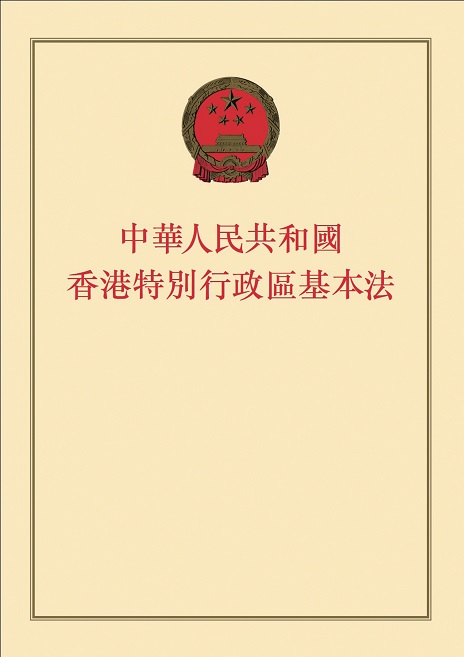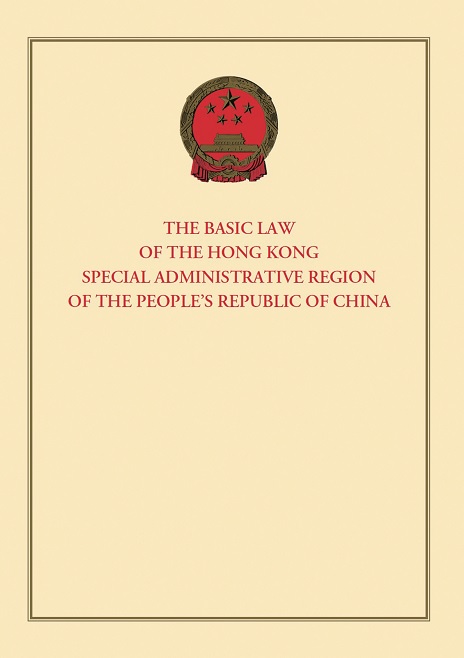參考文件
參考文件
For Reference

香港特別行政區基本法
The Basic Law of the Hong Kong SAR
第四章 政治體制
第一節 行政長官
第四十三條香港特別行政區行政長官是香港特別行政區的首長,代表香港特別行政區。
香港特別行政區行政長官依照本法的規定對中央人民政府和香港特別行政區負責。
第四十四條香港特別行政區行政長官由年滿四十周歲,在香港通常居住連續滿二十年並在外國無居留權的香港特別行政區永久性居民中的中國公民擔任。
第四十五條香港特別行政區行政長官在當地通過選舉或協商產生,由中央人民政府任命。
行政長官的產生辦法根據香港特別行政區的實際情況和循序漸進的原則而規定,最終達至由一個有廣泛代表性的提名委員會按民主程序提名後普選產生的目標。
行政長官產生的具體辦法由附件一《香港特別行政區行政長官的產生辦法》規定。
第四十六條香港特別行政區行政長官任期五年,可連任一次。
第四十七條香港特別行政區行政長官必須廉潔奉公、盡忠職守。
行政長官就任時應向香港特別行政區終審法院首席法官申報財產,記錄在案。
第四十八條香港特別行政區行政長官行使下列職權:
(一) 領導香港特別行政區政府;
(二) 負責執行本法和依照本法適用於香港特別行政區的其他法律;
(三) 簽署立法會通過的法案,公布法律;簽署立法會通過的財政預算案,將財政預算、決算報中央人民政府備案;
(四) 決定政府政策和發布行政命令;
(五) 提名並報請中央人民政府任命下列主要官員:各司司長、副司長,各局局長,廉政專員,審計署署長,警務處處長,入境事務處處長,海關關長;建議中央人民政府免除上述官員職務;
(六) 依照法定程序任免各級法院法官;
(七) 依照法定程序任免公職人員;
(八) 執行中央人民政府就本法規定的有關事務發出的指令;
(九) 代表香港特別行政區政府處理中央授權的對外事務和其他事務;
(十) 批准向立法會提出有關財政收入或支出的動議;
(十一) 根據安全和重大公共利益的考慮,決定政府官員或其他負責政府公務的人員是否向立法會或其屬下的委員會作證和提供證據;
(十二) 赦免或減輕刑事罪犯的刑罰;
(十三) 處理請願、申訴事項。
第四十九條香港特別行政區行政長官如認為立法會通過的法案不符合香港特別行政區的整體利益,可在三個月內將法案發回立法會重議,立法會如以不少於全體議員三分之二多數再次通過原案,行政長官必須在一個月內簽署公布或按本法第五十條的規定處理。
第五十條 香港特別行政區行政長官如拒絕簽署立法會再次通過的法案或立法會拒絕通過政府提出的財政預算案或其他重要法案,經協商仍不能取得一致意見,行政長官可解散立法會。行政長官在解散立法會前,須徵詢行政會議的意見。行政長官在其一任任期內只能解散立法會一次。
第五十一條 香港特別行政區立法會如拒絕批准政府提出的財政預算案,行政長官可向立法會申請臨時撥款。如果由於立法會已被解散而不能批准撥款,行政長官可在選出新的立法會前的一段時期內,按上一財政年度的開支標準,批准臨時短期撥款。
第五十二條 香港特別行政區行政長官如有下列情況之一者必須辭職:
(一) 因嚴重疾病或其他原因無力履行職務;
(二) 因兩次拒絕簽署立法會通過的法案而解散立法會,重選的立法會仍以全體議員三分之二多數通過所爭議的原案,而行政長官仍拒絕簽署;
(三) 因立法會拒絕通過財政預算案或其他重要法案而解散立法會,重選的立法會繼續拒絕通過所爭議的原案。
第五十三條 香港特別行政區行政長官短期不能履行職務時,由政務司長、財政司長、律政司長依次臨時代理其職務。*行政長官缺位時,應在六個月內依本法第四十五條的規定產生新的行政長官。行政長官缺位期間的職務代理,依照上款規定辦理。
註: * 參閱《全國人民代表大會常務委員會關於〈中華人民共和國香港特別行政區基本法〉第五十三條第二款的解釋》(2005年4月27日第十屆全國人民代表大會常務委員會第十五次會議通過)
-----------------------------------------------------------

For Reference
The Basic Law of the Hong Kong SAR
Chapter IV: Political Structure
Section 1: The Chief Executive
Article 43
The Chief Executive of the Hong Kong Special Administrative Region shall be the head of the Hong Kong Special Administrative Region and shall represent the Region.
The Chief Executive of the Hong Kong Special Administrative Region shall be accountable to the Central People’s Government and the Hong Kong Special Administrative Region in accordance with the provisions of this Law.
Article 44
The Chief Executive of the Hong Kong Special Administrative Region shall be a Chinese citizen of not less than 40 years of age who is a permanent resident of the Region with no right of abode in any foreign country and has ordinarily resided in Hong Kong for a continuous period of not less than 20 years.
Article 45
The Chief Executive of the Hong Kong Special Administrative Region shall be selected by election or through consultations held locally and be appointed by the Central People’s Government.
The method for selecting the Chief Executive shall be specified in the light of the actual situation in the Hong Kong Special Administrative Region and in accordance with the principle of gradual and orderly progress. The ultimate aim is the selection of the Chief Executive by universal suffrage upon nomination by a broadly representative nominating committee in accordance with democratic procedures.
The specific method for selecting the Chief Executive is prescribed in Annex I “Method for the Selection of the Chief Executive of the Hong Kong Special Administrative Region”.
Article 46
The term of office of the Chief Executive of the Hong Kong Special Administrative Region shall be five years. He or she may serve for not more than two consecutive terms.
Article 47
The Chief Executive of the Hong Kong Special Administrative Region must be a person of integrity, dedicated to his or her duties. The Chief Executive, on assuming office, shall declare his or her assets to the Chief Justice of the Court of Final Appeal of the Hong Kong Special Administrative Region. This declaration shall be put on record.
Article 48
The Chief Executive of the Hong Kong Special Administrative Region shall exercise the following powers and functions:
(1) To lead the government of the Region;
(2) To be responsible for the implementation of this Law and other laws which, in accordance with this Law, apply in the Hong Kong Special Administrative Region;
(3) To sign bills passed by the Legislative Council and to promulgate laws; To sign budgets passed by the Legislative Council and report the budgets and final accounts to the Central People’s Government for the record;
(4) To decide on government policies and to issue executive orders;
(5) To nominate and to report to the Central People’s Government for appointment the following principal officials: Secretaries and Deputy Secretaries of Departments, Directors of Bureaux, Commissioner Against Corruption, Director of Audit, Commissioner of Police, Director of Immigration and Commissioner of Customs and Excise; and to recommend to the Central People’s Government the removal of the above-mentioned officials;
(6) To appoint or remove judges of the courts at all levels in accordance with legal procedures;
(7) To appoint or remove holders of public office in accordance with legal procedures;
(8) To implement the directives issued by the Central People’s Government in respect of the relevant matters provided for in this Law;
(9) To conduct, on behalf of the Government of the Hong Kong Special Administrative Region, external affairs and other affairs as authorized by the Central Authorities;
(10) To approve the introduction of motions regarding revenues or expenditure to the Legislative Council;
(11) To decide, in the light of security and vital public interests, whether government officials or other personnel in charge of government affairs should testify or give evidence before the Legislative Council or its committees;
(12) To pardon persons convicted of criminal offences or commute their penalties; and
(13) To handle petitions and complaints.
Article 49
If the Chief Executive of the Hong Kong Special Administrative Region considers that a bill passed by the Legislative Council is not compatible with the overall interests of the Region, he or she may return it to the Legislative Council within three months for reconsideration. If the Legislative Council passes the original bill again by not less than a two-thirds majority of all the members, the Chief Executive must sign and promulgate it within one month, or act in accordance with the provisions of Article 50 of this Law.
Article 50
If the Chief Executive of the Hong Kong Special Administrative Region refuses to sign a bill passed the second time by the Legislative Council, or the Legislative Council refuses to pass a budget or any other important bill introduced by the government, and if consensus still cannot be reached after consultations, the Chief Executive may dissolve the Legislative Council.
The Chief Executive must consult the Executive Council before dissolving the Legislative Council. The Chief Executive may dissolve the Legislative Council only once in each term of his or her office.
Article 51
If the Legislative Council of the Hong Kong Special Administrative Region refuses to pass the budget introduced by the government, the Chief Executive may apply to the Legislative Council for provisional appropriations. If appropriation of public funds cannot be approved because the Legislative Council has already been dissolved, the Chief Executive may, prior to the election of the new Legislative Council, approve provisional short-term appropriations according to the level of expenditure of the previous fiscal year.
Article 52
The Chief Executive of the Hong Kong Special Administrative Region must resign under any of the following circumstances:
(1) When he or she loses the ability to discharge his or her duties as a result of serious illness or other reasons;
(2) When, after the Legislative Council is dissolved because he or she twice refuses to sign a bill passed by it, the new Legislative Council again passes by a two-thirds majority of all the members the original bill in dispute, but he or she still refuses to sign it; and
(3) When, after the Legislative Council is dissolved because it refuses to pass a budget or any other important bill, the new Legislative Council still refuses to pass the original bill in dispute.
Article 53
If the Chief Executive of the Hong Kong Special Administrative Region is not able to discharge his or her duties for a short period, such duties shall temporarily be assumed by the Administrative Secretary, Financial Secretary or Secretary of Justice in this order of precedence. *In the event that the office of Chief Executive becomes vacant, a new Chief Executive shall be selected within six months in accordance with the provisions of Article 45 of this Law. During the period of vacancy, his or her duties shall be assumed according to the provisions of the preceding paragraph.
* See Interpretation of Paragraph 2, Article 53 of the Basic Law of the Hong Kong Special Administrative Region of the People’s Republic of China by the Standing Committee of the National People’s Congress (Adopted at the Fifteenth Session of the Standing Committee of the Tenth National People’s Congress on 27 April 2005)
--------------------------------------------------------
二零一七年行政長官產生辦法 (節錄)
Methods for Selecting the Chief Executive in 2017 (section)
因此,根據《基本法》及全國人大常委會二零零四年的《解釋》,修改產生辦法是要走「五步曲」-
第一步: 由行政長官向全國人大常委會提出報告,提請全國人大常委會決定產生辦法是否需要進行修改;
第二步: 全國人大常委會決定是否可就產生辦法進行修改;
第三步: 如全國人大常委會決定可就產生辦法進行修改,則特區政府向立法會提出修改產生辦法的議案,並經全體立法會議員三分之二多數通過;
第四步: 行政長官同意經立法會通過的議案;以及
第五步: 行政長官將有關法案報全國人大常委會,由全國人大常委會批准或備案。
---------------------------------------------------
Methods for Selecting the Chief Executive in 2017 (section)
Therefore, according to the Basic Law and the Interpretation of NPCSC in 2004, amendments to the two methods have to go through the “Five-step Process” –
First Step: the CE to make a report to the NPCSC, so as to invite the NPCSC to decide whether it is necessary to amend the method of selection / formation;
Second Step: the NPCSC to make a determination on whether any amendment to the method of selection / formation may be made;
Third Step: if the NPCSC determines that amendments to the method of selection / formation may be made, the HKSAR Government to introduce to the LegCo a resolution on the amendments to the method for selecting the CE / method for forming the LegCo, to be passed by a two-thirds majority of all LegCo Members;
Fourth Step: the CE to consent to the resolution as passed by the LegCo; and
Fifth Step: the CE to lodge the relevant bill to the NPCSC for approval or for the record.
-----------------------------------------------------------
香港大律師公會
就法治及公民抗命發表的聲明
Statement of the Hong Kong Bar Association on the Rule of Law and Civil Disobedience
1. 香港現時有大批市民長期及大規模地佔領公共地方和道路,造成不同程度的交通阻塞的狀況。此等行為,有機會觸犯法律。香港大律師公會現發此聲明闡述公會對「公民抗命」的意見。
2. 參與這類活動的市民,大多以「公民抗命」為理由,認定自己的行為合理。正如加拿大英屬哥倫比亞省最高法院McEachern首席法官在R v Bridges案 ((1990) 78 DLR (4th) 529 §10) 的判詞中所說,「公民抗命」是一個哲學原則,而非法律原則。簡單來說,參與者故意犯法,目的在於引起別人關注,同時亦是抗議某些法律或政府行為的不公義。在參與者遭到刑事檢控時,「公民抗命」不能成為對有關控罪的答辯理由。一旦參與者因在公民抗命的過程中的行為涉嫌觸犯法例而被起訴,若有足夠證據證明控罪,則無論行為的動機如何崇高可敬,在法律上亦不構成任何答辯理由,法庭也不會在審訊時對受審者的政治理想作出評價或裁決。
3. 儘管公民抗命在法律上不成答辯理由,各地法院仍有從法治的角度評論公民抗命這概念。即使在云云法官當中,這個概念亦極具爭議性,看法也有極大分歧。以下兩個例子足以說明。
4. 在Everywoman's Health Centre Society (1988) v. Bridges一案中 ((1989) 61 D.L.R. (4th) 154),加拿大英屬哥倫比亞省最高法院Wood法官曾向參與公民抗命的被告人說過以下的一番話:
「你們當中有許多人,一邊向我保證你們尊重法律,另一邊卻把你們漠視法紀的行為定性為迫不得已的抗爭,並歸咎於政府未能回應你們的訴求而對法律作出相應的修改。……事實上,法律是你們唯一達至理想的工具,但你們透過故意不服從法律去尋求改變法律的行徑,反而威脅到法律的存亡。這等行為不僅是違法,而且完全是弄巧反拙的。」(強調後加)
5. 但另一方面,在英國一宗著名案例R v Jones (Margaret)案,賀輔明勳爵(Lord Hoffmann,現任香港終審法院非常任法官)的判決中[2007] 1 AC 136 §89卻有以下見解:
「諸位法官:發自良知的公民抗命,在本國有着悠久和光榮的傳統。認為某法律或政府行為屬不義,遂以違法行為表達他們的信念的人,有時會被歷史肯定。那些為爭取婦女投票權而抗命的女士們是一個顯明的例子。能包容這種抗爭或示威,是文明社會的印記。但違法者及執法者雙方都會認同一些相關的慣例。抗爭者的行為須合乎比例,並不會構成過度的破壞或不便,而且他們會以承擔法律制裁以證明他們信念真誠。警方及檢控官的行為亦會有所節制,裁判官在量刑時也會考慮抗爭者按良心而行的動機。」(強調後加)
6. 大律師公會的立場是,即使根據賀輔明勳爵對公民抗命原則作所的較寬鬆的解讀,參與佔領者也必須尊重其他未必與其見解相同的人士的權利和自由,也不應對社會造成過度的損害或不便,並須隨時準備對自己的行為負上刑責。與此同時,在執法和行使檢控酌情權時,警方及檢控官需時刻表現體諒及適度克制。
7. 令人遺憾的是,一如警方於二零一四年九月二十八日曾過度地使用催淚氣體般(公會就此於九月二十九日曾發出聲明譴責),現在有跡象顯示「佔領者」的持續行動,已開始對不少市民帶來過度的損害和不便。其中一個涉及佔領行動的團體,在呼籲道路使用者及鄰近市民作出犧牲體諒的時候,也明確承認「不少普羅百姓因交通受阻而令生活不便,有家長因子女未能上學而感到痛心、有打工仔因道路封鎖每天需多花數十分鐘上班、也有住客因樓下是佔領現場而受到噪音滋擾。」縱使「佔領者」大部份可幸都表現和平,以上仍是實況。
8. 此外,在現時延續的政治討論中,大律師公會驚聞某方面人士說任何有關憲制及法律原則的討論只是「玩弄學生和市民的花招」或只執着於「瑣碎的法律細節」。公會對政改的立場已於二零一四年四月二十八日及二零一四年七月十一日發出的聲明闡明,在此不贅。任何人不論對二十四年前基本法起草委員會所制訂的憲制模式有何意見,有關選舉制度前路的討論,仍必須在基本法框架下進行,這是不容爭議的原則。現任香港終審法院非常任法官包致金亦曾在二零一三年四月十日的演講中,亦曾說過任何有關香港一人一票選舉的建議,都必須在基本法框架下進行探討。
9. 就算對全國人大常委會於二零一四年八月三十一日作出的決定何等不滿,然而把憲制原則問題說成是「玩弄人的花招」或「瑣碎的法律細節」,是對法治精神公開的詆毀,此等言論十分危險。對此,公會重申前終審法院首席法官李國能先生於二零一四年八月十五 日發表的文章「在司法獨立的原則下,法官沒有任何主人」中所說:
「我希望社會能在《基本法》框架內理性討論政改。」
香港大律師公會
二零一四年十月八日
-------------------------------------------------------
Statement of the Hong Kong Bar Association on the Rule of Law and Civil Disobedience
1. The Hong Kong Bar Association (“HKBA”) issues this Statement to set out its views on Civil Disobedience which are relevant to the current situation of Hong Kong, where many residents have been engaged in prolonged and widespread occupation of public places and roads, resulting in obstruction of traffic. Such conduct is potentially unlawful.
2. Many residents who are engaging in such activities seek to justify their acts by reference to the concept of civil disobedience. As Chief Justice McEachern of British Columbia said in the case of R v Bridges (1990) 78 DLR (4th) 529 at paragraph 10, “civil disobedience is a philosophical, not a legal principle”. Put shortly, participants deliberately break a law to bring attention to – and as a protest against – the injustice of a law or government action. Civil disobedience does not constitute any defence to a criminal charge. If a participant is prosecuted for an offence committed in the course of civil disobedience and if the ingredients of the offence can be proved, his motive for committing the offence, however noble or honourable, is not a legal justification or defence to the criminal charge. Nor is his trial an occasion for the merits of his political cause to be adjudicated by a court.
3. Even though civil disobedience is not a defence in law, courts in different jurisdictions have nonetheless commented on the concept from the perspective of Rule of Law. The concept is, however, deeply controversial and divisive, even among judges. Two examples will suffice for present purposes.
4. In Everywoman's Health Centre Society (1988) v. Bridges (1989) 61 DLR (4th) 154, Wood J of the British Columbia Supreme Court said (to persons engaged in acts of civil disobedience):-
“Many of you, while assuring me of your respect for the law, have characterized your contemptuous conduct as an act of last resort stemming from frustration brought on by the failure of government to act upon your views and to change the law accordingly. …… by seeking to change the law by deliberately disobeying it you threaten the continued existence of the very instrument, indeed the only instrument through which you may eventually achieve the end you seek. Such conduct is not only illegal, it is completely self-defeating.” (emphasis added)
5. On the other hand, in the well-known case of R v Jones (Margaret)[2007] 1 AC 136, Lord Hoffmann (now one of the Non-Permanent Judges of Hong Kong’s Court of Final Appeal) said (at paragraph 89): -
“89. My Lords, civil disobedience on conscientious grounds has a long and honourable history in this country. People who break the law to affirm their belief in the injustice of a law or government action are sometimes vindicated by history. The suffragettes are an example which comes immediately to mind. It is the mark of a civilised community that it can accommodate protests and demonstrations of this kind. But there are conventions which are generally accepted by the law-breakers on one side and the law-enforcers on the other. The protesters behave with a sense of proportion and do not cause excessive damage or inconvenience. And they vouch the sincerity of their beliefs by accepting the penalties imposed by the law. The police and prosecutors, on the other hand, behave with restraint and the magistrates impose sentences which take the conscientious motives of the protesters into account.” (emphasis added)
6. The HKBA’s position is that even on a sympathetic view of civil disobedience (such as Lord Hoffmann’s), it is essential for participants to respect the rights and freedoms of other people who do not necessarily agree with their views and not to cause excessive damage or inconvenience. They should also be ready to accept the criminal consequences of their conduct. On the other hand, in taking law enforcement actions and in exercising prosecutorial discretion, police and prosecuting authorities need to act with sensitivity, restraint and proportionality at all times.
7. Regrettably, just as the Police acted excessively in their use of CS gas on 28 September 2014 (and which was the subject of the HKBA’s statement dated 29 September 2014), there are indictations that the prolonged acts of the participants have caused – or are at least beginning to cause – excessive damage and inconvenience to a not insignificant part of the community. As was readily and explicitly admitted bu one of the organizations involved in the movement in the course of calling for sacrifice by road-users and other surrounding citizens, “a lot of people had suffered inconvenience because of traffic congestion; parents were upset because their children could not attend school; employees had to spend extra tens of minutes per day to attend work because of road closure; residents were bothered by the noise made downstairs”. This is so, notwithstanding the laudable fact that most of the participants were and are behaving peacefully.
8. Lastly the HKBA views with considerable alarm the suggestion from some quarters, in the course of the continued political discourse, that any discussion of constitutional or legal principles is a form of “trickery” or insistence on “trivial technicalities”. The HKBA’s position on electoral reform has been set out in its two statements dated 28 April 2014 and 11 July 2014. The same will not be repeated here. Whatever views one may now have about the constitutional regime laid down by the drafters of the Basic Law 24 years ago, the inescapable fact is that any discussion of electoral progress must be conducted within the framework of what is constitutionally permitted. The Honourable Mr. Justice Bokhary, Non Permanent Judge of the Court of Final Appeal, was also reported to have said, on the occasion of a talk given on 9 April 2013, that any proposal of universal suffrage in Hong Kong must be pursued within the framework of the Basic Law. Whatever misgivings there may be concerning the decision of the Standing Committee of the National People’s Congress of 31 August 2014, it is dangerous – and inimical to the Rule of Law – for discussions of constitutional principle to be openly denigrated as “trivial technicalities” or “trickery”. On this, the HKBA can do no better than to repeat what the Honourable Mr. Andrew Li, former Chief Justoce of the Court of Final Appeal, said in this article “Under rule of law, an independent judiciary answers to no political masters” dated 15 August 2014: -
“I hope that there will be rational discussions within the parameters of the Basic Law”.
HONG KONG BAR ASSOCIATION
8 OCTOBER 2014





